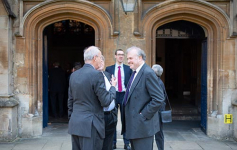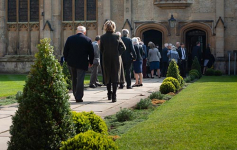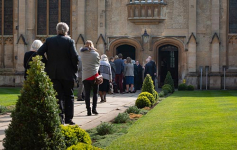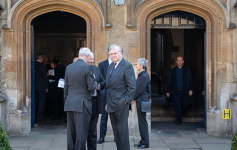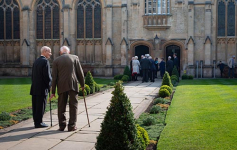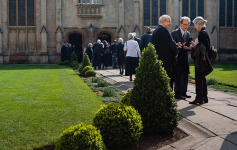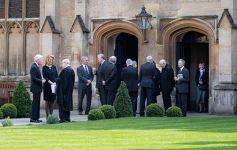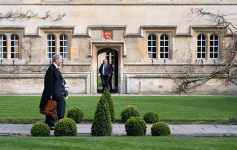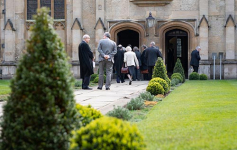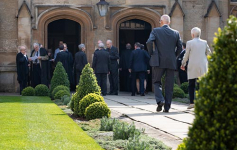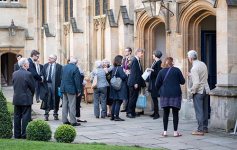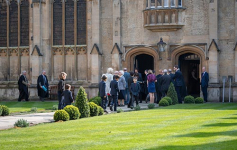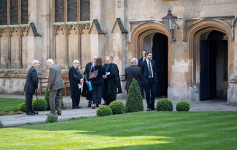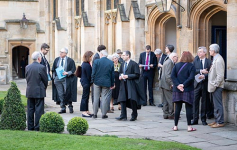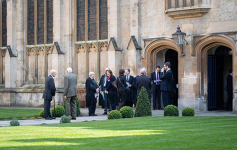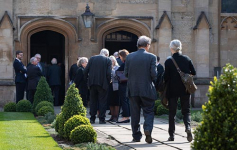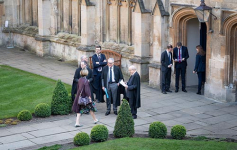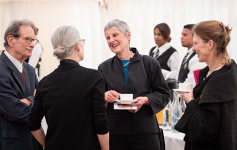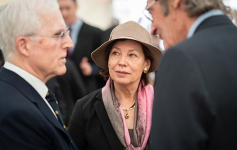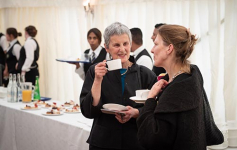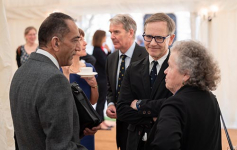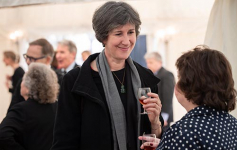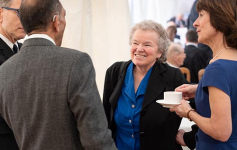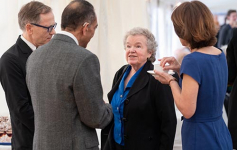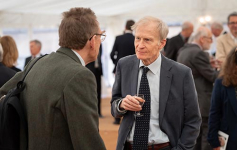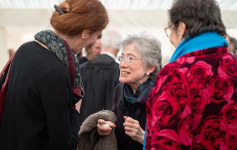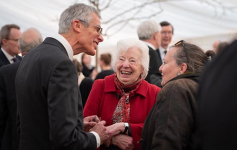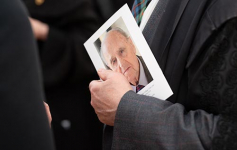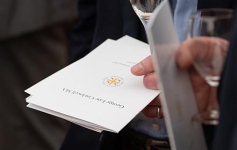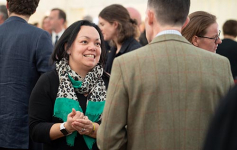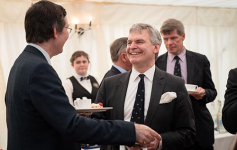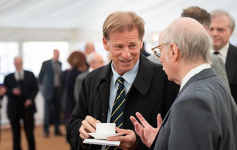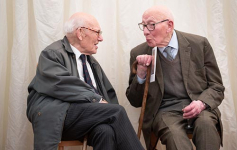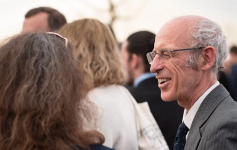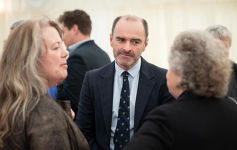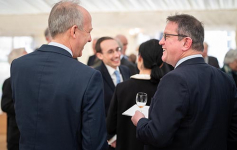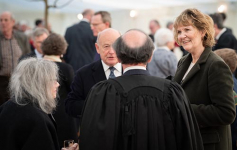Remembering George Cawkwell
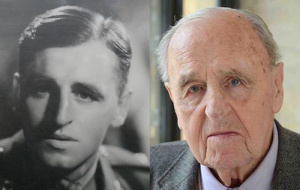 At gaudies and receptions and on my trips abroad, Old Members politely ask me “How is the College?” and then, usually, but with more animation “And how is George?” For many, the two questions are inseparable, because his understanding of the purpose of a College and its Fellowship embodied what they most valued about their own years at Univ. In his commitment to the College he was wholly exceptional even for his own times; over almost seven decades he touched the lives of generations of students who came up to Univ, leaving them enriched and wiser for having known him. As the tributes and memories below testify, it is difficult to imagine that any Oxford Fellow has stamped their personality on their former students, and lingered so vividly in their memory, more than George.
At gaudies and receptions and on my trips abroad, Old Members politely ask me “How is the College?” and then, usually, but with more animation “And how is George?” For many, the two questions are inseparable, because his understanding of the purpose of a College and its Fellowship embodied what they most valued about their own years at Univ. In his commitment to the College he was wholly exceptional even for his own times; over almost seven decades he touched the lives of generations of students who came up to Univ, leaving them enriched and wiser for having known him. As the tributes and memories below testify, it is difficult to imagine that any Oxford Fellow has stamped their personality on their former students, and lingered so vividly in their memory, more than George.
Sir Ivor Crewe, Master of University College
Published: 15 April 2019
Condolences and Recollections
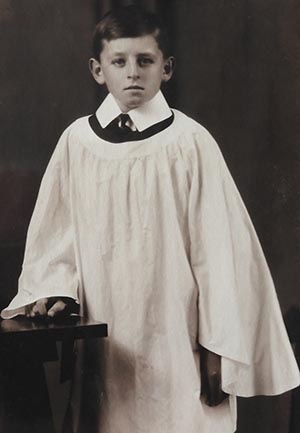
Chorister at St Mark’s church, Auckland
The lights dim a bit, with George no longer walking Univ’s halls.
Jim Shannon (1984, Politics)
I met George Cawkwell in the final months of his life: as a fellow Univ Antipodean Classicist living far from home, he insisted on adopting me and assumed a grandfatherly presence during my first few terms at Oxford. On my Sunday morning visits to have tea with George, which, upon reflection, were all too few, I was struck by the force of his intellect and the fullness of the life he has led here in Oxford. Each week, he remained upset that I was not yet married.
Even just shy of his century, George was holding court in his sitting room on the geography of Asia Minor, attending evensong, and challenging students to be better thinkers and scholars. I know that I am one of the last in a long line of students to have been mentored and supported by George, and I know that they and I will truly miss him. RIP.
Miranda Gronow (2017, MPhil Archaeology)
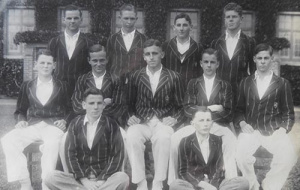
Captain of the cricket XI, King’s College
To the memory of George Cawkwell, a pillar of Univ Oxford for so long. An interesting and heartfelt obituary. (A one time Scotland rugby international!)
Nigel Holmes (2000, PPE)
George Cawkwell was an intriguing part of my university life, not least his penchant for wearing plus fours around college in the 1980s. Clashed somewhat with our mullets, big shoulder pads and ska shirts.
Richard Nourse (1983, Geology)
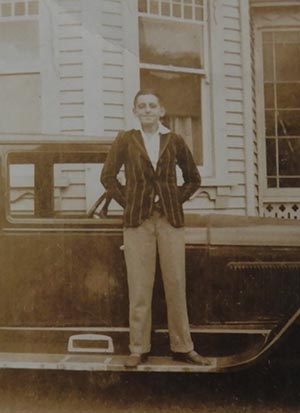
Date (and car) unknown
All very vividly invoked; I recall his declaiming “it is not only power that corrupts, so too does powerlessness” – and have repeated it many times, I hope, always correctly credited! What a giant he was.
Also from Martin: Oh how sad. I didn’t do Classics but he was always interested in my univ career. It helped I played in a Cuppers winning college cricket team of course, but his commitment to us all was abundant. He cast a long and charismatic shadow – then and now.
Martin Davidson (1979, English)
I recall George encouraging us from the towpath on icy Oxford mornings in 1980, and later when he came out to Hong Kong on a world tour. A great man, learned, civilised and deeply compassionate about students’ wellbeing well before such ideas were mainstream. RIP Kalos kagathos.
Peter Topping (1979, English)
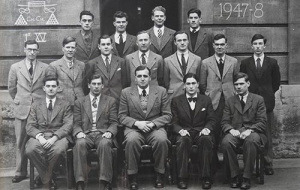
Captain of the Christ Church rugby XV 1948
He was a very great man, and his life was an extraordinary act of devotion to the College. Very sorry to hear this.
Simon Clarke (2003, History)
Very sad to hear of the death of my former tutor, George Cawkwell. George’s tutorials were the highlight of my week, both for their intellectual content and for the fine single malt with which he would greet me to his north Oxford home. RIP George. Thanks.
Chris Kendall (1987, Classics)
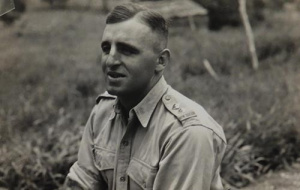
George Cawkwell – the soldier
Cawkers is dead! George Cawkwell, quintessential Oxford Don has died. His contribution to life at University College, Oxford cannot be over-stated including giving yours truly a regular rollicking on sporting field when he reasonably felt I was not pulling my weight. RIP Cawkers.
Professor Julian Lindley-French (1976, History)
He had a good run, but this is still terrible news. I will never forget drinking Madeira with him at 11am on a Sunday in my first year at Univ, or his taking my arm around Main Quad on the way to chapel. RIP George Cawkwell, one of the good ones.
Grace Mallon (2013, History)
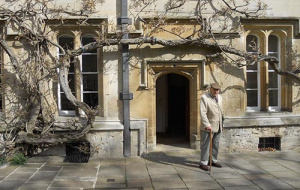
“The college fossil 2012, as old as the wisteria”, photo taken by his son Tim
We received your report today of the death of George with a mixture of sadness and relief. When I came to Univ. In 1950, George was the epitome of the College man and was good fun. When I came back to Oxford on 1959 as a doctor for students and others, I remember his remarks about my good sense but typically his concern about the welfare of my patients!
We remained close friends for the rest of his life. But recent months and particularly since his fall and back injury have been especially distressing. He made it clear to all that the sooner he died the better.
Though, of course, I am very sad to lose him and Sissel and I will miss his company and humour) we are relieved he is spared further suffering.
Godfrey Fowler, OBE (1950, Medicine)
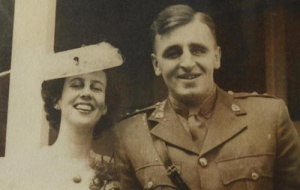
Wedding photo with Patricia, October 1945
I think you know how I feel about this. George was the Tutor for Graduate Admissions who let me into Univ … and, thus, the UK. Without him, my life from the age of 21 would have been 100% different. I am grateful to him forever.
Paul Gambaccini (1970, PPE)
I was very sorry to hear about George Cawkwell. He and Pat were incredibly welcoming to me when I was at Univ. My family lived in Australia and perhaps it was the antipodean link and being a Cawkwell scholar that meant he took an interest in me. I often visited George and Pat in North Oxford and had wonderful lunches and suppers there. They were both so warm and charming and George was always so smiley and uplifting that it was a joy to see him.
Thinking of his family and friends today.
Tara Dalton née Corry (1991, History)
So terribly sad to hear this news! The passing of George marks the end of an era at Univ.
David Wilson (1970, Modern Languages)
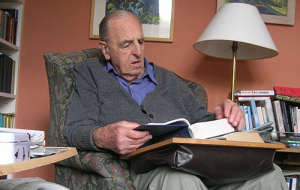
Consulting the dictionary 2008, photo taken by his son Tim
Very sorry to see this – though I read PPP, he kindly invited me into the GLC club, and it was a privilege to have known him. He represented all that is best about Oxford’s (and of course especially Univ’s) belief in creating and sharing knowledge.
Nicholas Jones (1973, PPP)
What an amazing life. I am so glad he died peacefully in the place he loved and where he was loved.
I first met George 70 years ago, when he came down to the Univ playing fields to support the rugby XV. As a brash young colonial from Kenya, I thought it was rather strange and even out of place to find a burly New Zealander – and rugby international – to be coming to Univ to teach the Classics of Ancient History! But what an inspired choice the Fellows had made.
A few years ago my daughter Tana let me know she would be visiting Oxford. I asked her, if she had the time, to visit Univ to ask after George. I had only seen him once, in recent years, since going down. She enquired of the Porter, who then came and found her, to say that George was just crossing the Quad. So she went and introduced herself ; George said “Oh yes… he was scrum half!” He then asked her to give him an arm and took her in to show her round the Senior Common room.
Bless him.
Simon Wollen (1948, Law)
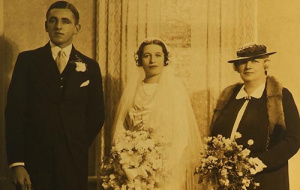
The wedding of his elder sister, Peggy, with their mother Isabella
RIP George Cawkwell. Was never taught by you but you taught Henry Boothroyd-Brooks in my year (were you retired already?). He called you “a real chap”. Later I read yr cliché-smashing pieces: colonization, tyranny, hoplites, Thuc; later still the hard C4th pieces.
John Ma, Professor of Classics at Columbia University
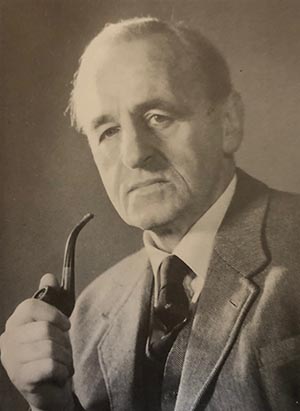
Published in in the 1987 Univ Record
Sally and I were married in June 1961 at St Aldates where we had been regulars. Afterwards there was a reception in the Alington Room and George Cawkwell had the role of Master of Ceremonies-he did a great job, hardly restrained of course by any traditional British reserve. No doubt he took a particular interest in me when I came up in 1959 because I was a New Zealand Rhodes Scholar-always interested in how I was getting along but never over-curious about what BCL studies were like with my main tutors-Tony Guest and Norman Marsh.George loved to express his wonderful sense of humour by playing with words,though he told me he was unhappy with the prerdominant place of linguistic analysis in Oxford philosophy.
On one occasion I had managed to splash some ink on an obscure library book. I sent George, then the Librarian, a note explaining the accident and ending: “Please forgive me.” He replied “Please give me for” but omitted to enclose an invoice. George maintained a huge correspondence with old members, complete with Latin quotations. He came to New Zealand on a lecture tour featuring Philip of Macedon and Constantine and we went to dinner at Government House with George and his wife (having carefully attended, well in advance, to dinner jacket availability).I remember how he pored over the list of his pupils’ Greats schools results while staying with us-and that he was able to renew acquaintance with several other members like Denis McLean, Rob Aspden (my best man) and Bill Wakelin, all of them exponents, like George, of the game for which New Zealand remains most widely known.
He was elected a life member of the NZ Rhodes Scholars Association a few years ago. I am sure we all have very happy memories of this devoted, College-centred don.
Dr Don Mathieson QC (1959, Law)
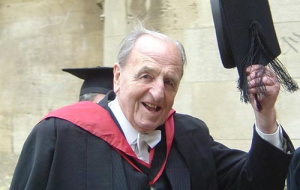
George doffing his mortarboard
I will always remember George’s tutorial party piece on the real value of the plosive “f”.
Richard Finlayson (1958, English)
I am not a Univ alumnus, but I had the anecdote below from my father. Although it hinges on Latin, I sent it to Chris Pelling (a former tutor of mine, as it happens!) He encouraged me to send it on, and gave me the email address I’m using. Chris also said he’d send it to the Master, so he must think it’s OK!
The Roman historian Tacitus summed up the short but disastrous reign of the emperor Galba with the words: “omnium consensu capax imperii nisi imperasset”, which might be paraphrased, “Everyone thought he’d make an excellent emperor until he actually tried to do it.”
In the 1950s George ran the Emeriti, the Oxford dons’ cricket team, and my father ran the Cambridge equivalent. At one of their annual fixtures, Cambridge arrived with an umpire who was a scientist of international repute and known to be a great lover of cricket. He proceeded to give a string of hopeless decisions which resulted in a Cambridge victory.
George left the field in high dudgeon, muttering in a stage whisper to a colleague, “omnium consensu capax umpirii nisi umpirasset.”
Richard Smail, Hon. Priest-in-Charge of St Leonard & St James, Rousham
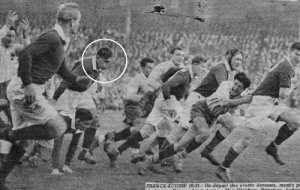
Scotland – France, New Year’s Day 1947
I was one of George’s early pupils, only a few years after he succeeded my uncle G H Stevenson as Ancient History Fellow. Some years after I graduated, I visited him in College accompanied by my wife ( an Edinburgh graduate like George’s father). He entertained us to tea in his room, and in due course looked at his watch and said “well CHAPS, I’ll have to go as I have to give a lecture!”. My wife found this mode of address very quaint – I suppose the inclusive term today would be GUYS. A great character indeed.
Kenneth Anderson (1950, Greats)
George was the most warm-hearted of tutors and the most exacting of teachers. His welcome to tutorials in his own home was always gracious. Careless words and faulty arguments in essays were not tolerated, but I always left not only knowing that I had been instructed but also feeling that I was deeply card for. I am sure that others of my generation enjoyed the same experience.
Simon Hitchings (1989, Classics)
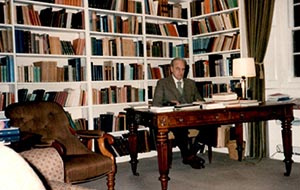
In study at Univ 1986
George was so kind to me when I was a Classics undergraduate at Univ. Inviting me for drinks at his home, and curious about myself, my background and my interests, he made a young outsider feel welcome and included. I’ll always treasure the copy of Homer that he gave me upon graduation. Condolences to George’s family and colleagues, and the fondest of memories.
Lauren Curtis (2002, Classics)
While walking in a throng of students from the St Cross building, mentally deep in re-living the lecture I’d just given, I was called back to the real world by a driver crawling along the kerb beside me – George, of course – who leaned across, opened the passenger door and called out, “Mrs Cooper, you’d make a lousy prostitute.”
Helen Cooper, Univ Fellow 1978-2004
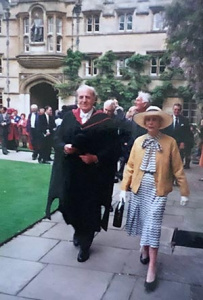
George and Pat in 1999 during the Queen’s visit to Univ
In 2004, when I was back at Univ for a year and living on a narrow boat moored at Osney, I asked George and Pat to dinner aboard. As we cruised up the Thames to Godstow, George and Pat stood at the front of the boat, arms around each other, while George pointed out Oxford landmarks. It was the first time that they had cruised up the Thames, and they were as enchanted as two teenagers. That is the abiding memory that I have of that remarkable couple.
Michael Jago (1965, Literae Humaniores)
I am very sad at the passing of George Cawkwell; he was one wonderful man a great inspiration to me and my late husband, Ian Williamson. He was one of the kindest most understanding men we knew and it was a pleasure to know him and his late wife Pat, who he missed dearly; but now he will be with her again. Since my husband and I retired from Univ we still had a lovely connection with George, often went to his for a coffee even maybe a whisky, which George loved. We enjoyed his words of wisdom and his many stories; he had a good sense of humour. RIP George – With Much Love always. Never forgotten.
Sandra Williamson, former Hall Manager at Univ. Ian, her late husband, was Caretaker at Univ.
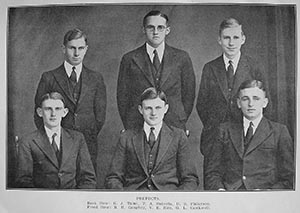
As a prefect at King’s College
George was a tall and imposing figure; as the College’s then 1st VIII Cox I was neither. George was an intellectual colossus and outstanding ancient historian. As a Moderations “survivor”, I was neither. Which George knew but kindly overlooked. I was in awe of George so when in my final year over a madeira he fixed me with a piercing glare from that aquiline countenance and said “well dear boy, what are you going to do with yourself when you go down?” I rather gabbled out the first thing that occurred to me “I thought of law, George”. “Law” he growled “dear boy you’re far too nice a chap to be a lawyer – anything else?” “Public service” I stuttered. “Public service!” he boomed “Worthy, dear boy but you are not duplicitous and machiavellian enough to be a public servant”. I forget now his suggestion. So when, at a Gaudy some years later and well into my public service career in the Royal Air Force as a lawyer, George asked “well, dear boy, did you follow my advice?”, I could only mumble an assent. His later discovery of the truth earned me approval that I had joined the armed forces but reproach it was of course the wrong Service.
Lindsay Irvine (1977, Classics)
George Cawkwell had a huge impact on those lucky enough to encounter him. His kindness, thoughtfulness and friendship stretched well past the time limits of a degree…
Paola De Carolis, Journalist Corriere della Sera
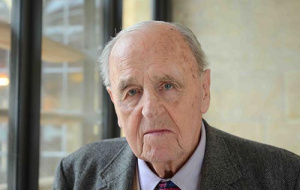
College portrait, 2014
George made it clear from the start of our tutorials with him that he had serious expectations of us: I remember him saying that when he was reading Greats he did a least 8 hours work a day- this, he thought, might have been because of the immediate post war earnestness in Oxford, but we should nevertheless aim to do no less. Whatever struggles I might have had to live up to this, and however inadequate I felt my own efforts were, I always drew inspiration and encouragement from the breadth and depth of George’s insightful examination of the evidence. George was away in New Zealand, if I remember correctly teaching at Auckland University, for some of my time reading Greats, but he was back for my final year. What I most remember about that time was his sympathetic ear, kindness and good advice through a time of personal difficulty. Many years later I took my daughter to Univ to see whether she might want to apply. George made us both very welcome, gave my daughter a lot of help and spoke about my time at Univ as if it were yesterday. That is how I will remember him: of course a profound historian, but also a wise, generous and respected friend.
Julian Hansen (1963, Classics)
RIP George Cawkwell, dead at age 99. He beat Isocrates by one year. I have learned so much from this man, and a quote from his “Philip of Macedon” is the epigram to my next book.
James Romm, Professor of Classics at Bard College
I was a Choral scholar and have fond memories of seeing George at many of our Sunday evensong services. His presence reminded me of how we are part of a long-standing institution that has been providing an excellent education for many years, even if our time as students is fleeting.
Maria G
The Obituary by Christopher Pelling can be read here.
Memories from Lord Butler
It is 60 years since George Cawkwell was my tutor during my Greats course (1957-1961). Although George’s specialism at the time was fourth century Greek history, he was entirely competent to tutor me and Richard Ingrams, with whom I shared tutorials, on the fifth century.
George’s style was vulnerable to affectionate mimicry (though not in his presence). Richard was adept at a hilarious parody of George’s tutorial on the Battle of Marathon. George had a theory that the way in which the Persians held their shields and spears caused their battle line to crab to the left (or perhaps to the right – I no longer remember precisely). George would leap from his chair to demonstrate this and, as he became more excited, his posh English accent would migrate to broad New Zealand. We enjoyed this enormously.
I remember George’s meticulous attention to detail, for example in finding clues in the Athenian tribute lists or in the text of Thucydides. This characteristic was reflected in his miniscule but precise handwriting, maintained until the end of his life. He could read his own handwriting long after I had reached the stage of needing reading glasses to do so.
Apart from the provision of Madeira, an eccentric feature of his tutorials was his penchant for the smell of tobacco. Although I was not a smoker, I was required to hold a lit cigarette while he commented on my essays. In today’s regulatory world he would no doubt be accused of subjecting his pupils to the effects of passive smoking.
His insistence on precision is illustrated by an episode during his brief time when he was Procurator for Old Members of the College. It was his habit to circulate what he described as his annual encyclical to Old Members. When I congratulated him on a particularly witty and informative edition of this document, he lamented that it contained some typing errors, not surprisingly in view of the challenges presented to the typist by the size of his handwriting. When I said that these typing errors did not distract from the content, he replied “Oh well, Robin, you always were a sloppy fellow”.
What Old Members of the College will remember him for, above all, was his lasting interest in each of those whom he came to know, his astonishing memory for detail and his uncanny insight into their concerns. This extended well beyond his own pupils. He had an extraordinary instinct for those who needed a little loving care and who would benefit either from an invitation to his Bentham or GLC dining clubs, or more personal hospitality around his and Pat’s table in Staverton, and later Moreton, Road.
Some 20 years after I had gone down, I met him on a social occasion and he asked me three questions which went to the heart of my concerns at the time – “How is your career progressing?” (It was in the doldrums). “What is happening to the value of your property?” (We lived uncomfortably near the recent riots in Brixton). “Are you bringing up your children to be good Christians?” (My wife and I were uneasy about our deficiencies in that respect).
When I was about to retire from the civil service, he encouraged me to throw my hat into the ring for appointment as Master of the College. I remined him of this subsequently when, having been appointed, I ran into some difficulty and he described the headship of an Oxbridge College as “the worst job in the world”. I pointed out that he had encouraged me to apply. “Ah yes, Robin” he replied “but I took the view that the College needed you”. For George, the needs of the College came first.
He may have had a guilty conscience because he did not spare himself in briefing both my wife and myself meticulously about what the role of Master and Master’s spouse required. His letter about the personal characteristics of the Fellows must be subject to the 30 year rule. He always remained available to us with advice, support and encouragement. He was a faithful attender at Gaudies as well as College Feasts. After I had given my first speech to a Gaudy as Master, I asked George whether it had been okay. “I fell asleep at an early stage” was his reply.
George was a regular attender of evensong in the College Chapel, as well as at the Communion Service on Sunday mornings and the breakfasts which followed them. During the Service, he did not take kindly to either extending or receiving the Sign of Peace. At that moment in Service he was always immersed in impenetrable prayer.
My wife and I feared that he would not long survive the death of his beloved Pat, but his interest in his friends, former pupils and the external world kept him going. After the end of my Mastership, my wife and I frequently visited him at Moreton Road, often armed with the “Mistress’s fish pie” to which he was particularly partial. We also received frequent telephone calls when he wanted to know our reactions to public or other events, although I always initiated calls to congratulate him on the achievements of the All Blacks rugby team. The calls invariably started the same way – “How are you, George?” “Very frail, I’m afraid, and becoming frailer by the minute”. The formula was the same from well before it was true.
He remained a lively and interested conversationalist. On my wife’s last visit to him, a few weeks before his death, he received her with his usual warmth but she had the impression that his attention was mainly on the Prime Minister’s latest statement on Brexit which he was watching on the Parliamentary television channel. The body eventually failed but the mind never did.
If it were not an unkindness to hope that anyone would live forever, we wish that George could have done so. He leaves a big hole in our lives.
Robin Butler, Lord Butler of Brockwell, Master of Univ 1998-2008
Memorial Service Photographs
Memorial Service Video
Please also see the accompanying Order of Service.
The Cawkwell Teaching Fund in Classical Languages
The College is grateful to the many students, colleagues, and friends of the Cawkwell family, who, following George’s death in March 2019, have kindly offered contributions towards a post in his name. By way of response to these offers, the College seeks contributions for The Cawkwell Teaching Fund in Classical Languages, which will allow a lecturer to provide increased hours of tuition in Latin and Greek.
The Need
In general, Classics flourishes at Univ, with three members of academic staff in the subject: Dr Bill Allan (Classical Languages and Literature), Dr Lisa Kallet (Ancient History), and Dr Richard Ashdowne (Languages and Linguistics). The College takes on average seven to eight new undergraduate students per year, and five new graduate students.
However, success in both Mods and Greats at Oxford depends heavily on the student having a strong linguistic basis. Increasingly, A-Levels (or equivalent) in Latin and Greek do not meet this standard, as the amount of text read in the original and the amount of grammatical training is inadequate. Although the central University offers some linguistic help in the first two terms, it is insufficient to bridge the gap, and Colleges increasingly have to offer additional teaching to enable the students to fulfil their potential. Moreover, Univ frequently attracts talented students who have not had the opportunity to study any Classical languages before arriving at Oxford, and these students are also in need of extra College teaching in order to catch up with their peers who have studied Latin and/or Greek at school.
While the College’s academic staff provide tutorials and classes in Greek and Latin languages as well as literature, more teaching hours are needed to provide the students with the level of support they need to do well at Oxford. It is no coincidence that the two Colleges with the strongest Mods and Greats results in recent years (New College and Magdalen) are the only two Colleges with specialized Lecturers dedicated to language teaching.
The Cawkwell Teaching Fund for Classical Languages would therefore allow Univ to provide the increased level of tuition in Latin and Greek that Classicists require. This would entail ongoing funding of £50,000 per year. In addition, it is hoped that donations to this fund will allow us to establish a further endowment in George’s name; this would require a sum of approximately £1.25m.
Naming opportunities
In line with the College’s protocols for naming opportunities, an Old Member or friend of the College providing a substantial lead gift, ordinarily at endowment level, for the project, would be able to name the fund jointly, eg the ‘Smith-Cawkwell Teaching Fund for Classical Languages’. It is important to note as well that all suggestions for naming require Governing Body approval. For such benefactions, a Gift Agreement would be drawn up covering payment arrangements, duration, title of fund, purpose of fund, and other details.
Smaller gifts may be made through the College website, at univalumni.org. You will find ‘Cawkwell Teaching Fund for Classical Languages’ listed in the first drop-down menu.
Or, for a further discussion, please phone the Development Office on 01865 276 958, or email Martha Cass – Martha.Cass@univ.ox.ac.uk.
Thank you for your interest in honouring George, and in maintaining the teaching of Classics at Univ. Your support is very much appreciated.
Published: 15 April 2019

